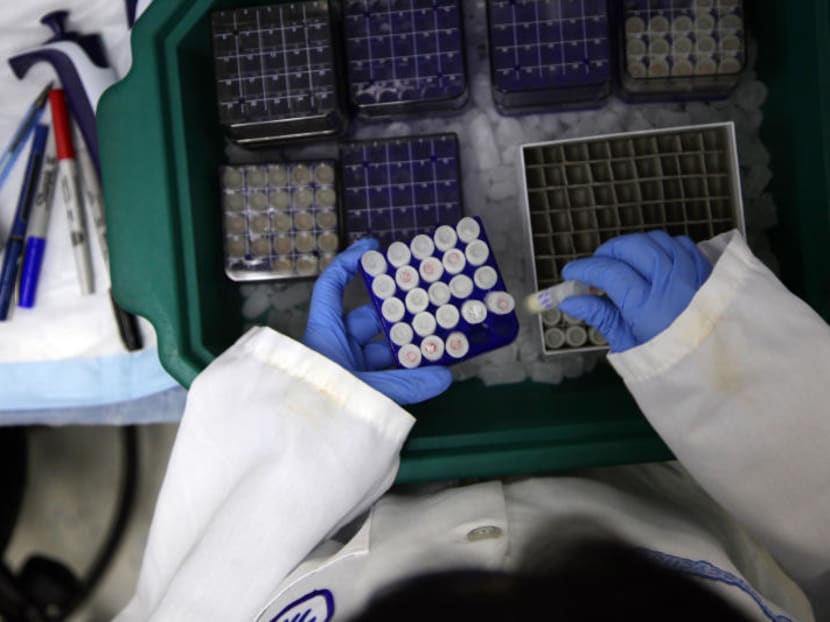Consuming low-fat diet with prostate cancer drug could cut costs by 75 per cent, improve outcomes
SINGAPORE – Eating a low-fat meal with Abiraterone Acetate, a standard drug for prostate cancer, instead of on an empty stomach could improve outcomes and drastically lower costs – by as much as 75 per cent – for prostate cancer patients.

A joint study by local and US researchers has shown that eating a low-fat meal with prostate cancer drug Abiraterone Acetate can improve outcomes and lower costs for patients. New York Times file photo
SINGAPORE – Eating a low-fat meal with Abiraterone Acetate, a standard drug for prostate cancer, instead of on an empty stomach could improve outcomes and drastically lower costs – by as much as 75 per cent – for prostate cancer patients.
Researchers from the National University Health System (NUHS), including the National University Cancer Institute, Singapore (NCIS), and National University Hospital (NUH), were part of the multi-site study with the University of Chicago and cancer centres in the United States. They designed the clinical trial to compare the cost, risks and benefits to bring cost savings to patients.
This was part of Singapore’s greater efforts to address escalating costs of oncology drug treatment with research that “focuses on high quality and high value care”, said the NUHS in its media release.
Prostate cancer is the third most common cancer among men here, and the fifth leading cause of cancer deaths. According to the Singapore Cancer Registry, 3,456 men were diagnosed with prostate cancer from 2009 to 2013.
Abiraterone Acetate, which was approved for use in 2013 by the Health Sciences Authority of Singapore, is used to treat metastatic castration-resistant prostate cancer. The study found that patients who consume the drug with food could decrease their daily dosage, help prevent digestive issues and cut costs by 75 per cent.
Consuming the drug with a low-fat meal – 7 per cent fat, or about 300 calories – could see the amount of Abiraterone Acetate absorbed and entering the blood stream multiply by four or five times. That could increase to 10 times with a high-fat meal of 57 per cent fat, or 825 calories. Doctors, however, do not recommend a high fat diet due to other health risks.
Patients usually fast overnight and eat four 250 milligramme pills first thing in the morning. They wait at least one hour before eating breakfast.
Researchers had observed that this standard therapy seemed wasteful and caused inconvenience to patients, and they designed a randomised clinical trial in 2012 involving 72 patients with advanced prostate cancer to see if the drug could be used more efficiently, and to help reduce costs.
Half of the patients followed the standard therapy, while the other group ate one 250mg pill – one fourth of the recommended dose – with a low-fat breakfast and patients were advised to avoid high-fat food such as bacon.
At the end of the study, they found that the patients who took a lower dose with breakfast kept the disease under control as well as the group that took the recommended dose. They also found that the drug’s ability to lower levels of prostate-special antigen, a surrogate marker for prostate cancer, was slightly higher for patients who took the lower dose with food when they were measured at 12 weeks.
“With this finding, we are confident that the patient gets to enjoy a simplified schedule, has slightly more control over his daily life and the opportunity for cost-savings,” said Dr Yong Wei Peng, senior consultant, Department of Haematology-Oncology, NCIS.
Patients could also get a “cheaper and more effective option”, said Dr Yong, as a month’s supply of the drug costs about $4,000 to S$5,000, amounting to over S$60,000 a year. Many patients take the drug for two to three years.
The progression-free survival rate for patients in both groups is about 8.6 months. Despite the small study size, the authors of the study were confident that outcomes were positive for patients who took the lower dose with food, and that they were comparable to those who took the recommended dose without food.
“There is a lot of interest in Asia to initiate a larger trial for validation of the study,” said Associate Professor Edmund Chiong, senior consultant, Division of Surgical Oncology (Urology), NCIS, and head, Department of Urology, NUH. He is also an author in this study.
“This may potentially result in substantial cost savings for patients in the region.”
Professor Goh Boon Cher, NCIS’s senior consultant and deputy director (Research), who is leading this initiative at NCIS, added that the trial is part of “a larger effort in NUHS to mitigate the high cost of oncology oral medications”.
He added that the Value of Oncology Treatment Group has been formed at NCIS to “formulate strategies to assess the value of cancer drugs against metrics such as costs, risks and efficacy to bring about more benefits to patients”.
The study was a collaboration between the NCIS and the Department of Urology of NUH, in partnership with US researchers from the University of Chicago, US National Cancer Institute, Emory University and the Illinois Cancer Care.






